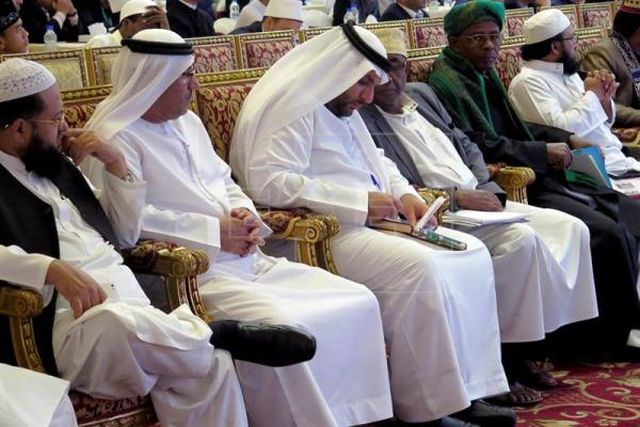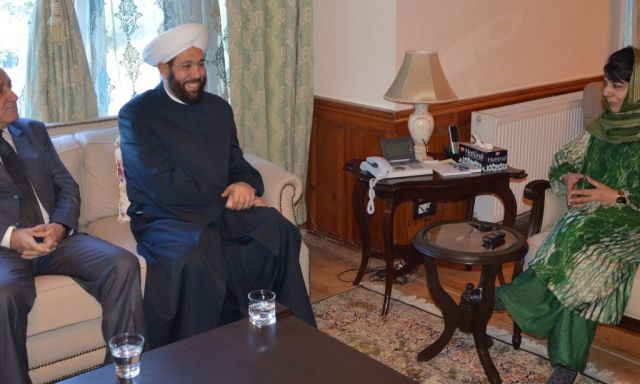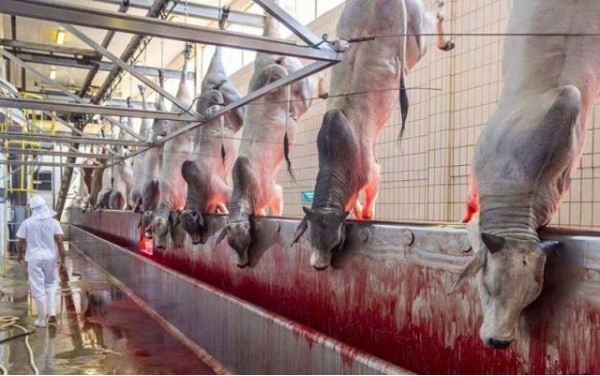
by admin | May 25, 2021 | Muslim World

Grand muftis, Islamic religious leaders, from 73 countries participate in the conclusion of the fourth edition of the “Renovations of Fatwa” conference held in Cairo, Egypt, Oct. 18, 2018. EPA-EFE/Shady Roshdy
Cairo : Grand muftis, Islamic religious leaders, from 73 countries on Thursday concluded here a three-day conference aimed at moderating how religious figures discuss Islam so as to counter the effects of extremism and increase the involvement of Muslim youth in peaceful displays of their faith.
During the fourth edition of the conference, held in Cairo and focused on the issuance of “fatwa” – religious guidelines promulgated by religious leaders, participants discussed a broad spectrum of topics, including organ transplants, divorce and stem cells.
“Our main concern in this summit is to redefine fatwa and reclaim fatwa from the radicals,” Ibrahim Negm, adviser to Egyptian Grand Mufti Shawki Allam told Efe.
Touching on topics ranging from divorce and marriage practices to inheritance and scientific activities, a fatwa is released publically as a way for Muslims to live an involved and connected spiritual life in the modern world.
“Our purpose is to revisit the Muslim tradition and … the heritage (writen in) books hundreds of years ago. We want to read them afresh in the light of contemporary issues. We are living in the 21st century, we are living in a global village and this has impacted how fatwas are issued,” Negm added.
The conference also discussed women’s rights and the use of the “niqab,” the long Muslim women’s gown and veil which completely covers the body and face.
“We emphasize the essence rather than the form … the way people dress is different from one Muslim country to another, so you have in the Gulf a certain way of dressing while in Egypt the way Muslims dress is different … (The same is the case) in Turkey. Meanwhile, in Europe Muslim (men and women dress in a different way), this is based on customs and traditions of Muslim community,” Negm stressed.
Negm announced that religious leaders will “launch an online portal that reaches young people and speaks to them in different languages”.
—IANS

by admin | May 25, 2021 | Muslim World, News
 Srinagar : Syrian Grand Mufti Ahmad Bader Eddin Muhammad Adib Hassoun and Jammu and Kashmir Chief Minister Mehbooba Mufti on Friday discussed ways and means to end the cult of violence in Muslim countries, an official statement said.
Srinagar : Syrian Grand Mufti Ahmad Bader Eddin Muhammad Adib Hassoun and Jammu and Kashmir Chief Minister Mehbooba Mufti on Friday discussed ways and means to end the cult of violence in Muslim countries, an official statement said.
Currently visiting the Valley, the Syrian Grand Mufti called on the Chief Minister here, it said.
“The two leaders discussed several issues confronting the Muslim world and the need to weed out the cult of violence from the Muslim society. They also underscored the need for inculcating values of peace, tolerance and coexistence among the younger generation.
“The two leaders exchanged ideas on education, social system, history and welfare of the Muslim world and the need for an effective inter faith communication to spread the message of Islam,” the statement said.
Mehbooba Mufti informed the visiting dignitary of various socio-developmental initiatives undertaken by her government in the State including the education and empowerment of women and invited him to visit the state again for exhaustive sessions with the local Islamic scholars and academicians, it added.
“The Grand Mufti informed the Chief Minister that he was happy to meet her and know about her views on the subjects discussed,” the statement said, adding he termed her a “role model for the Muslim world”.
Noting Syrian women would take an inspiration from her personality, he also extended an invitation to her to visit Syria.
The visit of the Syrian Grand Mufti has been coordinated by Indian Council of Cultural Relations, and he was accompanied by Syrian Ambassador to India Riad Abbas, Advisor in Syrian Embassy, Nazen Nasri and other officials of Syrian Embassy besides ICCR Regional Director Balwant Thakur, the statement said.
—IANS

by admin | May 25, 2021 | Halal Food, Halal Industries, News

An inside view of a cow slaughter unit owned by Al-Kabeer exports Pvt.Ltd. Rudraram Village, Andhra Pradesh, Patancheru, Medak, Hyderabad – 500 033.. Al-Kabir is owned by Subhash Sabarwal, a Dubai based NRI and managed by his brother, Satish Sabarwal,(File Photo)
By Mohammed Shafeeq
Hyderabad: (IANS) With the ban on beef in some states and the upcoming Eid-ul-Azha triggering a fierce debate on cow slaughter across the country, a group of Islamic scholars in southern India has appealed to Muslims to avoid sacrificing cows, bulls and bullocks in the community’s larger interest.
The scholars have advised Muslims to show pragmatism in the prevailing situation and instead opt for alternate animals permitted by the Sharia to ensure that peace is maintained and there are no impediments in their larger duty of “dawat-e-deen” of introducing Islam to non-Muslims.
Backed by all schools of thought, the group has taken up the campaign through social media, meetings, pamphlets and Friday sermons in mosques in different states of southern India.
“Our message is that Muslims should not take law in their hands but desist from sacrificing cow, bulls and bullocks for maintaining peace. This will also help in introducing Islam to others,” Syed Hussain Madani, an Islamic scholar heading the campaign, told IANS.
The scholar has suggested that the community should avoid sacrificing cows to protect life and property. People trading in cows, bulls and bullocks have been suffering loss of life and property and sometimes ending up harming others.
Madani quoted ‘Hadith’, or the sayings of Prophet Muhammad, that “There should be neither harming nor reciprocating harm.”
Noting that the Prophet sacrificed two sheep on Eid-ul-Azha, he said: “Since the Prophet Muhammad is the best model for us, we should follow him. Sacrificing cow is allowed but it is not ‘afzal’ (preferable),” he said.
Every year, hundreds of bulls and bullocks are brought to the city for sacrifice on Eid day. Such animals are in huge demand because seven people can have share in each. At Rs.2,500 to Rs.2,800 each share, this works out more economical than Rs.6,000 to Rs.7,000 for a goat or sheep.
The scholars pointed out that sacrificing per se is not “farz” (obligation) but “sunnat” (practice of the Prophet). “Allah doesn’t burden more than one can bear. There is ample room to avoid this (sacrifice of cow) in the prevailing situation when there are legal restrictions and communal disharmony over the issue,” said Madani.
As many families take a share in such animals to distribute meat among the poor, Madani said that the poor may be helped in many other ways.
The ulema, while noting that slaughter of cow, bulls and bullocks are linked to the livelihood of a group, argue that the interest of the entire community should get priority.
“Prevention of means of ‘fasad’ (mischief) is better than the benefits we may get from certain things,” said Madani.
The scholars are also of the opinion that the misconceptions about cow slaughter and the misinformation spread by some elements affects “Dawate-e-deen” and since this is an obligatory duty of every Muslim, it should get priority over sacrificing cow, bulls or bullocks.
“Some miscreants themselves sell cows and strengthen their economy but take legal action against those who buy cows and sometimes even kill the buyers. Desisting from the sacrifice of such animals will deny them an opportunity to indulge in mischief,” added Madani.
Well-known personalities like Mohammed Abdul Raheem Qureshi, president of the Majlis-e-Tameer-e-Millat and assistant secretary of the All India Muslim Personal Law Board, Moulana Khalid Saifullah Rahmani, Moulana Aneesur Rehman Azmi of Chennai, Moulana Mufti Nassem Ahmed Ashrafi, and Moulana Mufti Mahboob Shareef Nizami are backing the initiative.
The appeal also has the backing of Muslim political leaders and legal experts. It also made reference to a suggestion by some political leaders that giving up eating of beef for a couple of years will show its impact on the economy and those opposing it will be forced to amend the legislation.
(Mohammed Shafeeq can be contacted at m.shafeeq@ians.in)




